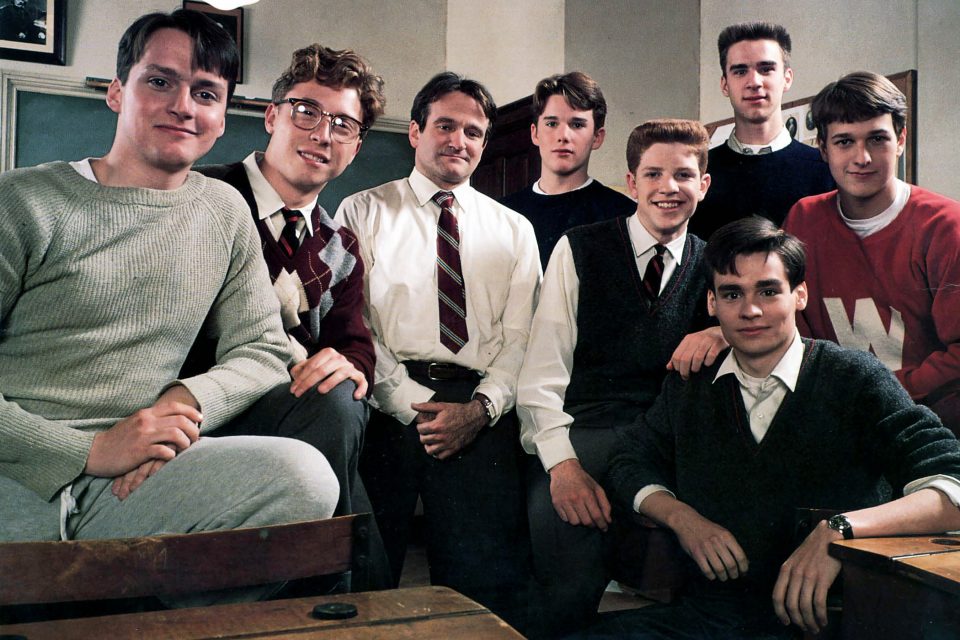Dead Poets Society is a 1989 American teen drama film, directed by Peter Weir, set in the 60s in the state of Vermont, where Professor Keating, a literature teacher, is transferred to the Welton boys’ boarding school, a conservative and traditionalist environment, to teach literature. He immediately became the spokesperson for a new way of teaching, more colloquial and confidential, which leads the students to show a particular interest in his subject.
The professor helps his pupils to look at life from another perspective and at the same time to understand its beauty, through the development of a critical spirit and a personal and unconventional thought, which comes into contrast with the idea of the rest of the society of that time.
Thanks to Keating’s teachings, young students are able to rediscover themselves, to cultivate their passions and ambitions and to be genuinely interested in poetry, which is a stimulus and a tool for imagination and beauty. Another important theme dealt with in the film is represented by the transience of life and how ephemeral it is, as the professor teaches his students during their first meeting, and it is precisely for this reason that they must “suck the marrow of life” and relish its beauty as much as they can, as Horace quotes “carpe diem”, or “seize the moment”, because one day it will be too late.
You have to live a full life and you must be proud of having lived it, always making choices with your own head, even if these do not agree with those of others. In fact, we must not take everything that is said and transmitted to us as true, but it is important to develop one’s own opinion and a critical spirit through knowledge, as the professor explains when during his second lesson he invites the students to tear off the introductory pages of the literature book, as there are no rules to understand an artist and his own worth.
Keating represents the “captain” of the students, however at the same time he is their companion, he supports them in their choices, listening to them and helping them to walk their own path and develop their skills. Precisely for this reason, a group of students formed by the protagonists come together united by the love for poetry and re-establish the sect of extinct poets, an “order” created by Keating and his companions at their age. Thanks to the sect, the boys rediscover themselves: far from the rest of the college, they feel free to express themselves and to make poetry, without rules or written schemes. Each boy faces a different growth path from one another: Todd, the most shy and insecure of all, gains self-confidence; Knox manages to get the girl he was in love with and Charlie lives bravely and clashes with the boarding school authorities.
Neil following the teachings of the professor enrolled in a theatre course, which represents his true passion, against the will of his father who wanted his son to become a doctor and that doesn’t understand his wishes but considers them miserable whims. Precisely because of the impossibility of realizing his ambitions, Neil takes his own life, as he realizes that he will never be able to go his own way and do what he really aspires to since his father has already planned everything for him.
The boy’s tragic end upsets the whole school, especially his friends and Professor Keating who are forced to live in a new climate of injustice that was born in the boarding school and that sees the literature teacher as the one who led Neil to suicide.
For this reason, the professor is fired and he is forced to leave the chair of literature and his loyal students: the scene represents the turning point of the film as the boys first of all Todd, who was the most shy, stand up on the desks , as the professor had made him do during one of his lessons, to make him understand how they learned his teaching and the pain and sacrifices they had to undergo were not in vain. Keating looks at them one last time with emotion, pride, sadness, immense affection and the awareness of having transformed his students into free thinkers.
The rebellion of the boys to greet the beloved professor represents the meaning of the film, the search for freedom, the importance of values such as justice, the enhancement of feelings such as love and the virtue of friendship, which give beauty to life and make it worth living.
Elettra Pera Fassio 4Dcl
